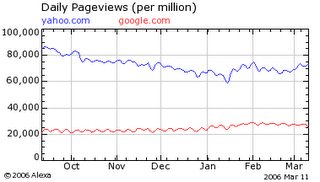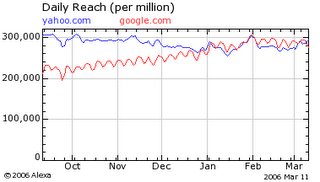 Seven years ago, I invested the time to customize a My Yahoo page and have incrementally added quite a bit to it since then. It has become my primary RSS aggregator, my sports and finance ticker and my first source of news. (I would even use it for web searches, but for some idiotic reason, the folks at Yahoo have not programmed the page to load with the search box in focus; as long as I have to make an extra click, I might as well click in Firefox's Google box.)
Seven years ago, I invested the time to customize a My Yahoo page and have incrementally added quite a bit to it since then. It has become my primary RSS aggregator, my sports and finance ticker and my first source of news. (I would even use it for web searches, but for some idiotic reason, the folks at Yahoo have not programmed the page to load with the search box in focus; as long as I have to make an extra click, I might as well click in Firefox's Google box.)In a piece for Fortune last week, David Kirkpatrick warns Wall Street not to "stare so hard at Google you miss Yahoo." He highlights Yahoo's relatively cheap P/E ratio of 24x (including a bunch of one-time gains last year including the sale of some Google stock) when compared with Google's 67x . He argues that Yahoo is catching up to Google in terms of search quality and has made some smart moves to capitalize on social networking with its Flickr and Delicious acquisitions. He believes Yahoo will soon be considered Google's peer.
My hedge fund friend thinks otherwise. He questions Yahoo's future relevance entirely. His argument goes something like this: AOL was "stage one" of the Internet -- consumers did not even know how to get online in the early days, and AOL's sheltered dial-up service made it accessible.
Yahoo is stage two of my friend's "training wheels for the Internet" theory. As everyone learned to get online, they needed a place to go that conveniently aggregated their media content and introduced new services. Yahoo served that purpose.
In stage three, however, as consumers finally comprehend and master features like bookmarking and RSS aggregating, will Yahoo still have a purpose? Though I'm currently a devoted Yahoo user, I tend to agree with my hedge fund friend. This Alexa graph supports his theory:
 In terms of reach, Yahoo is falling behind. The number of consumers relying on Yahoo the way I do is not growing. Google has overtaken Yahoo as the primary Internet home page, and as users like me find superior best-of-breed alternatives to replace the components of their My Yahoo pages, I suspect the flat blue line in the graph will trend downward.
In terms of reach, Yahoo is falling behind. The number of consumers relying on Yahoo the way I do is not growing. Google has overtaken Yahoo as the primary Internet home page, and as users like me find superior best-of-breed alternatives to replace the components of their My Yahoo pages, I suspect the flat blue line in the graph will trend downward.





3 comments:
you alluded to "one time charges" but not sure if you saw that Kirkpatrick posted a correction:
"A more useful price-to-earnings ratio for Yahoo! is 53. The more commonly reported trailing P/E of 24 for Yahoo was distorted this past year by several special items, including the sale of a large chunk of Google stock. The 53 figure is adjusted for these items."
makes it harder to make the P/E ratio argument
Soon you won't see the difference between your internet and your desktop. When features like Apple's Dashboard progress one step further your RSS aggregation and a search box will simply be icons permenantly displayed on your desktop. You can already do it with the weather (ie weatherbug); in fact, I'm surprised it hasn't already happened.
Also... Google allows you to make a customisable content front page (including RSS aggregation) and like all things Google, it's cleaner than Yahoo.
wow, I'd love to bet against the both of you.
Perhaps you guys are ignoring how both google and yahoo are likely to have approached an upper limit of users.
That upper limit can only gradually expand over time.
That's an alternate explanation for yahoo's lack of growth as well as google's slowing growth.
In addition, the monetization of that increasing traffic is likely to be marginal.
Anyway... if the online population is slowing in the expansion of "profitable" visitors expanding the reach becomes less important, understanding new ways to provide services to profitable users becomes paramount.
I am sure that yahoo/msn/google and google have some phds working on it ;)
Post a Comment